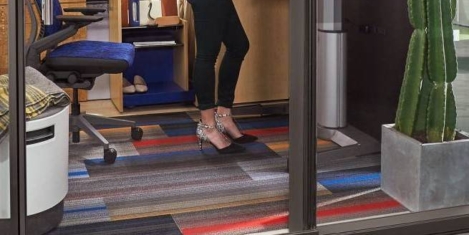August 18, 2017
Artificial intelligence to become most important workplace tech trend over next decade
 Technology analyst Gartner claims in a new report that artificial intelligence (AI) will become the biggest technology megatrend of the next decade, suggesting that organisations need to focus their main efforts on AI based technology in the short to medium term. The study suggests that ‘digital business execution’ requires more frequent and complex decision making, continuous problem solving and rapid pattern recognition, all of which require workforce digital dexterity. In most organisations, however, responsibility for helping employees develop the desire and ability to exploit a wide range of transformative technologies — highlighted in the Gartner, Inc. Hype Cycle for Digital Workplace, 2017 — does not have to rest with any group or individual.
Technology analyst Gartner claims in a new report that artificial intelligence (AI) will become the biggest technology megatrend of the next decade, suggesting that organisations need to focus their main efforts on AI based technology in the short to medium term. The study suggests that ‘digital business execution’ requires more frequent and complex decision making, continuous problem solving and rapid pattern recognition, all of which require workforce digital dexterity. In most organisations, however, responsibility for helping employees develop the desire and ability to exploit a wide range of transformative technologies — highlighted in the Gartner, Inc. Hype Cycle for Digital Workplace, 2017 — does not have to rest with any group or individual.











 Organisations are taking serious security risks by allowing employees to access workplace IT systems remotely while on their summer holiday, a telecoms company has warned. According to research by the corporate IT and cyber-security arm of Deutsche Telekom, nearly a third of employees (31 percent) use free Wi-Fi hotspots, and nearly a quarter (24 percent) use them for work-related emails and documents. These are a big danger area as they are insecure and easy for hackers to clone (getting access to all email and web traffic, including any work documents and passwords). It also warns that 28 percent of employees email work documents to and from their personal email, despite this creating numerous security problems. Ten percent use free USB charging points at airports and stations; and these ports can be used to transfer viruses and malware to unsuspecting users. The blame cannot solely be placed on the employees though, as just 28 percent of employees have never in their working career had any cyber security training to protect themselves and their employer.
Organisations are taking serious security risks by allowing employees to access workplace IT systems remotely while on their summer holiday, a telecoms company has warned. According to research by the corporate IT and cyber-security arm of Deutsche Telekom, nearly a third of employees (31 percent) use free Wi-Fi hotspots, and nearly a quarter (24 percent) use them for work-related emails and documents. These are a big danger area as they are insecure and easy for hackers to clone (getting access to all email and web traffic, including any work documents and passwords). It also warns that 28 percent of employees email work documents to and from their personal email, despite this creating numerous security problems. Ten percent use free USB charging points at airports and stations; and these ports can be used to transfer viruses and malware to unsuspecting users. The blame cannot solely be placed on the employees though, as just 28 percent of employees have never in their working career had any cyber security training to protect themselves and their employer.






 Britain’s most family friendly and flexible employers have been recognised in this year’s Top Employers for Working Families Awards. Now in their 8th year, the annual Top Employers for Working Families Special Awards from the UK’s work life balance charity cover 11 categories across a range of work life policies and practices. Four new sector-specific awards are being introduced this year for the private, public and third sectors; as well as a category for small employers. Sarah Jackson OBE, chief executive of Working Families, said: “In many ways, flexible working and family friendly working have never been more part of the bloodstream of British business. We had a record-breaking number of entries this year, showcasing a wealth of exciting approaches to creating agility in the workplace. Congratulations to all this year’s Top Employers for Working Families award winners, singled out because they offer leading flexible workplaces that support the grain of their employees’ lives. I look forward to working with them to make work work, for people, families and the economy, so that families thrive and business prospers.”
Britain’s most family friendly and flexible employers have been recognised in this year’s Top Employers for Working Families Awards. Now in their 8th year, the annual Top Employers for Working Families Special Awards from the UK’s work life balance charity cover 11 categories across a range of work life policies and practices. Four new sector-specific awards are being introduced this year for the private, public and third sectors; as well as a category for small employers. Sarah Jackson OBE, chief executive of Working Families, said: “In many ways, flexible working and family friendly working have never been more part of the bloodstream of British business. We had a record-breaking number of entries this year, showcasing a wealth of exciting approaches to creating agility in the workplace. Congratulations to all this year’s Top Employers for Working Families award winners, singled out because they offer leading flexible workplaces that support the grain of their employees’ lives. I look forward to working with them to make work work, for people, families and the economy, so that families thrive and business prospers.”


 Nearly three quarters (70 percent) of employers say it’s healthy for employees to have someone to confide in at work, according to new research, but it claims, 1 in 4 employees would consider leaving the company if their friend left. The totaljobs research which featured responses from over 4,000 employees and 103 employers on the latest trends in workplace relationships and office politics found that two thirds (65 percent) of UK workers are finding ‘work spouses’ in the office – that one person who they are very close. Although over half of employers (56 percent) say strong work friendships increase productivity and 60 percent of work spouses say their relationship means ‘they look forward to going into work’, which can help improve staff retention, 1 in 4 (23 percent) say if their friend left, they would consider leaving themselves. Nearly one in 10 (7 percent) go as far as to say that their work spouse leaving the company would be ‘like a bereavement’.
Nearly three quarters (70 percent) of employers say it’s healthy for employees to have someone to confide in at work, according to new research, but it claims, 1 in 4 employees would consider leaving the company if their friend left. The totaljobs research which featured responses from over 4,000 employees and 103 employers on the latest trends in workplace relationships and office politics found that two thirds (65 percent) of UK workers are finding ‘work spouses’ in the office – that one person who they are very close. Although over half of employers (56 percent) say strong work friendships increase productivity and 60 percent of work spouses say their relationship means ‘they look forward to going into work’, which can help improve staff retention, 1 in 4 (23 percent) say if their friend left, they would consider leaving themselves. Nearly one in 10 (7 percent) go as far as to say that their work spouse leaving the company would be ‘like a bereavement’.









August 17, 2017
How workplace design shapes and reflects organisational hierarchies
by Angela Love • Comment, Facilities management, Workplace design
(more…)